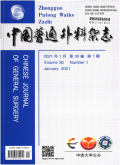中国普通外科杂志2024,Vol.33Issue(1):9-17,9.DOI:10.7659/j.issn.1005-6947.2024.01.002
肝移植术后抗体介导的排斥反应与胆道狭窄的关系及诊疗策略分析
Analysis of the relationship between antibody-mediated rejection and biliary strictures following liver transplantation and its diagnosis and treatment strategies
摘要
Abstract
Background and Aims:Antibody-mediated rejection(AMR)is relatively uncommon after liver transplantation,but it poses a significant risk factor for graft function loss.This study investigated the occurrence of AMR after liver transplantation,its relationship with biliary strictures,and the associated diagnostic and therapeutic strategies. Methods:The clinical data from 203 patients who underwent brain death donation liver transplantation at the First People's Hospital of Kunming from January 2016 to October 2023 were retrospectively analyzed. Results:Among the 203 liver transplant recipients,20 cases developed acute rejection after transplantation,including 7 cases of AMR and 13 cases of T-cell-mediated acute rejection(TCMR).Additionally,18 cases had biliary strictures.Among patients with acute rejection,6 cases(30.0%)developed biliary strictures,while among those without acute rejection,12 cases(6.6%)developed biliary strictures,indicating a significantly higher incidence in the former group(P=0.002).In the AMR group,5 cases(71.4%)developed biliary strictures,of whom 3 cases had concomitant biliary strictures at the time of acute AMR diagnosis and were treated accordingly,while 2 cases developed biliary strictures during the one-year follow-up after AMR treatment.Only 1 TCMR patient(7.7%)developed biliary stricture 3 years after operation,the incidence of biliary strictures in AMR patients was significantly higher than in TCMR patients(P=0.007).Among the 7 AMR patients,one experienced rapid deterioration of liver function within two months after transplantation,leading to death despite steroid pulse therapy.The remaining 6 patients,after managing biliary strictures and receiving AMR-specific treatment,showed normalization of liver function. Conclusion:AMR after liver transplantation increases the risk of biliary strictures.For patients with acute AMR and concurrent biliary strictures,prompt consideration of AMR diagnosis and corresponding treatment is essential,in addition to ensuring biliary drainage.关键词
肝移植/胆汁淤积/移植物排斥/抗体Key words
Liver Transplantation/Cholestasis/Graft Rejection/Antibodies分类
医药卫生引用本文复制引用
莽源祎,杨彦,高杨,马俊,陈国煜,张升宁,王新超..肝移植术后抗体介导的排斥反应与胆道狭窄的关系及诊疗策略分析[J].中国普通外科杂志,2024,33(1):9-17,9.基金项目
云南省科技厅科技计划基金资助项目(202201AY070001-198,202302AA310018) (202201AY070001-198,202302AA310018)
"春城计划"高层次人才创业创新团队专项基金资助项目(2022SCP002-C-11). (2022SCP002-C-11)

